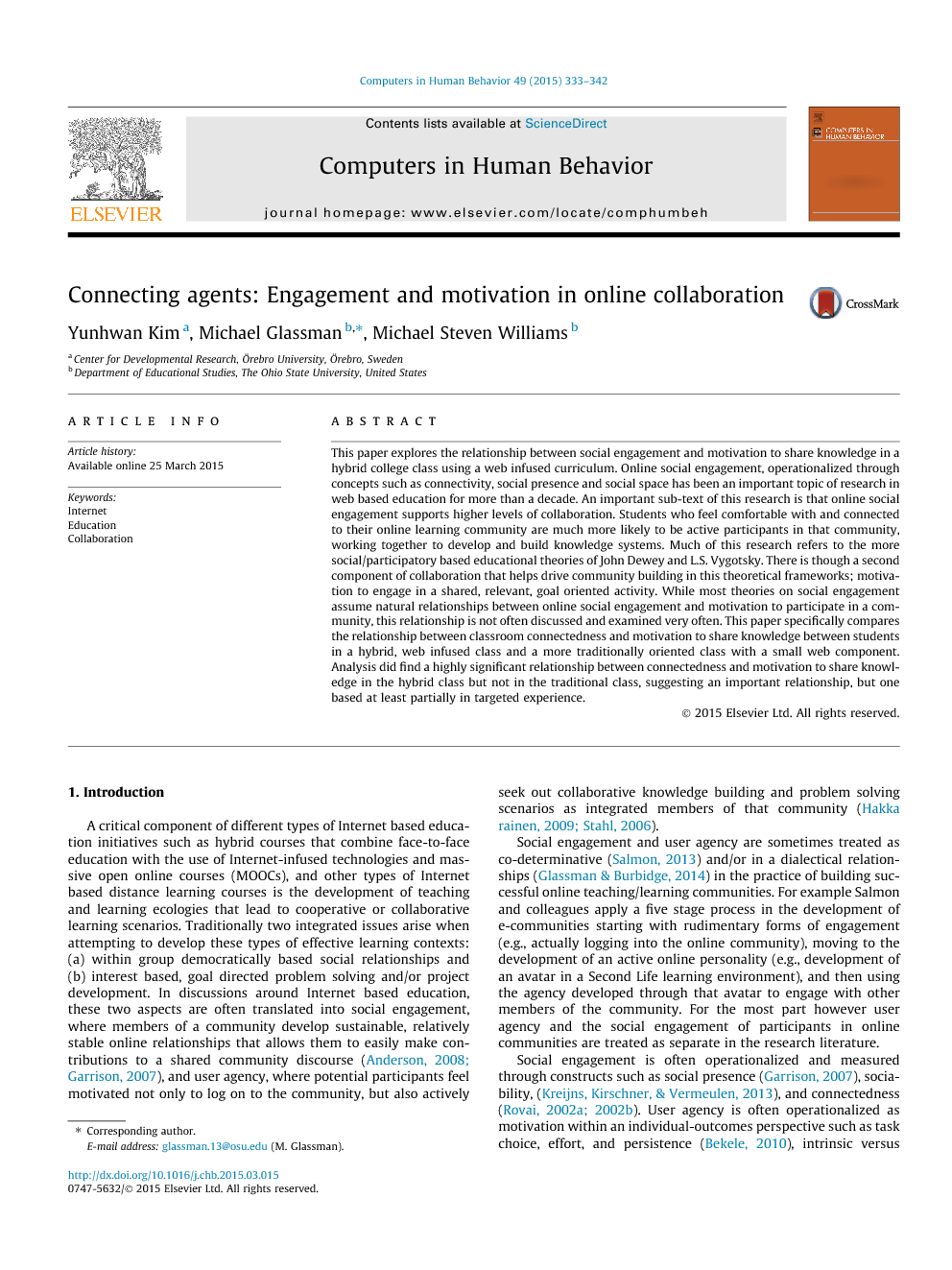اتصال عوامل: تعامل و انگیزش در همکاری آنلاین
| کد مقاله | سال انتشار | تعداد صفحات مقاله انگلیسی |
|---|---|---|
| 30117 | 2015 | صفحه PDF |

Publisher : Elsevier - Science Direct (الزویر - ساینس دایرکت)
Journal : Computers in Human Behavior, Volume 49, August 2015, Pages 333–342
چکیده انگلیسی
This paper explores the relationship between social engagement and motivation to share knowledge in a hybrid college class using a web infused curriculum. Online social engagement, operationalized through concepts such as connectivity, social presence and social space has been an important topic of research in web based education for more than a decade. An important sub-text of this research is that online social engagement supports higher levels of collaboration. Students who feel comfortable with and connected to their online learning community are much more likely to be active participants in that community, working together to develop and build knowledge systems. Much of this research refers to the more social/participatory based educational theories of John Dewey and L.S. Vygotsky. There is though a second component of collaboration that helps drive community building in this theoretical frameworks; motivation to engage in a shared, relevant, goal oriented activity. While most theories on social engagement assume natural relationships between online social engagement and motivation to participate in a community, this relationship is not often discussed and examined very often. This paper specifically compares the relationship between classroom connectedness and motivation to share knowledge between students in a hybrid, web infused class and a more traditionally oriented class with a small web component. Analysis did find a highly significant relationship between connectedness and motivation to share knowledge in the hybrid class but not in the traditional class, suggesting an important relationship, but one based at least partially in targeted experience.
مقدمه انگلیسی
A critical component of different types of Internet based education initiatives such as hybrid courses that combine face-to-face education with the use of Internet-infused technologies and massive open online courses (MOOCs), and other types of Internet based distance learning courses is the development of teaching and learning ecologies that lead to cooperative or collaborative learning scenarios. Traditionally two integrated issues arise when attempting to develop these types of effective learning contexts: (a) within group democratically based social relationships and (b) interest based, goal directed problem solving and/or project development. In discussions around Internet based education, these two aspects are often translated into social engagement, where members of a community develop sustainable, relatively stable online relationships that allows them to easily make contributions to a shared community discourse (Anderson, 2008 and Garrison, 2007), and user agency, where potential participants feel motivated not only to log on to the community, but also actively seek out collaborative knowledge building and problem solving scenarios as integrated members of that community (Hakkarainen, 2009 and Stahl, 2006). Social engagement and user agency are sometimes treated as co-determinative (Salmon, 2013) and/or in a dialectical relationships (Glassman & Burbidge, 2014) in the practice of building successful online teaching/learning communities. For example Salmon and colleagues apply a five stage process in the development of e-communities starting with rudimentary forms of engagement (e.g., actually logging into the online community), moving to the development of an active online personality (e.g., development of an avatar in a Second Life learning environment), and then using the agency developed through that avatar to engage with other members of the community. For the most part however user agency and the social engagement of participants in online communities are treated as separate in the research literature. Social engagement is often operationalized and measured through constructs such as social presence (Garrison, 2007), sociability, (Kreijns, Kirschner, & Vermeulen, 2013), and connectedness (Rovai, 2002a and Rovai, 2002b). User agency is often operationalized as motivation within an individual-outcomes perspective such as task choice, effort, and persistence (Bekele, 2010), intrinsic versus extrinsic motivations (Lee, Cheung, & Chen, 2005), or based on qualitative and quantitative analyses of behavior within a shared project context (Hakkarainen, 2009 and Stahl, 2006). Few studies actually measure the relationship between user agency and social engagement. The correlation is often assumed (e.g., an advanced social space for engagement will naturally lead to participation; Kreijns et al., 2013). This paper looks specifically at the relationship between motivation to participate in an online community and the level of online social engagement of participants in that community. By examining the relationship between user social engagement and motivation, rather than assuming it, we believe we can gain greater understanding of online collaborative activity. Recognition that there is a dynamic relationship between social engagement and agency may help lead to more complex educational innovations and curricula that look to integrate the two as part of the teaching and learning processes.
نتیجه گیری انگلیسی
As we move deeper into the Internet age online education is going to be a larger part of our lives. The ability to accomplish complex tasks—to set and achieve goals through Internet based collaborations—will only become more important in our everyday lives. The possibilities for new activities as part of distributed, though highly engaged communities are extraordinary. Transient, targeted Internet communities with high levels of collaboration among users can spur innovation and open users up to new types of experiences. There is a flip side to these possibilities. Individuals can join online communities where they feel confused or alienated, and quickly drift away from the network. Online education that focuses both on the social and agentic qualities of Internet collaboration may have the best chance of enhancing online activities and placing students on a positive learning trajectory.

